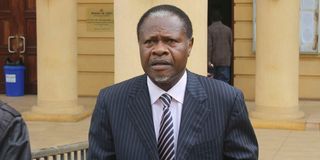DPP Haji loses bid to extradite Okemo in Sh1.5bn graft case

Former Finance minister Chris Okemo leaving a Nairobi court during a past hearing.
The State has failed in its bid to extradite former Finance Cabinet minister Chris Okemo to the United Kingdom for trial over corruption and theft of Sh1.5 billion, putting the Director of Public Prosecutions (DPP) Noordin Haji under fresh scrutiny.
Chief Magistrate Roseline Oganyo yesterday discharged Mr Okemo from the extradition suit after the DPP failed to adduce either oral or documentary evidence to demonstrate why the former Cabinet minister should be taken to the UK to face criminal charges in the Island of Jersey.
The magistrate’s ruling was triggered by the DPP’s decision dated September 20 to close the case without calling witnesses.
At the time of closing the case, the magistrate stated, the prosecutor, Mr Alexander Muteti (senior assistant DPP), said the DPP had decided not to call five witnesses that he had planned to invite to give evidence against Mr Okemo.
The witnesses from the Island of Jersey were to give their testimonies virtually via video link from September 20 to 22. They were also to rely on documentary evidence.
“(But) when the case was called for hearing on September 20, the prosecutor said he won’t call the five witnesses and will rely on the documentary evidence,” said Ms Oganyo.
“He submitted 14 bundles of documents in court as evidence. He would have called the witnesses to produce the documents. So no documentary evidence has been tendered in accordance with the evidentiary rules. The move by Mr Muteti caught the court and counsel by surprise,” she added.
Prosecution blocked
In her ruling, she also blocked the prosecutor from reopening the case and calling the five witnesses to testify orally.
“To accede to the DPP’s request will be unfair to Mr Okemo in view of the age of the matter. The DPP must be held to his decision as he did on September 20 to close the case without evidence or witnesses. So no evidence has been adduced to warrant the court to allow the extradition,” said the magistrate.
She stated that since extradition proceedings are criminal in nature, the prosecutor was within his mandate not to call the witnesses and close the case. The DPP exercised his powers, she ruled.
“Decision by public officers has consequences. I am not persuaded by the change of mind by the DPP to reopen the case. It has dragged in court for long,” she said, adding that the extradition, which started in 2011, had tormented Mr Okemo.
Concurring with Mr Okemo’s lawyer Fred Ngatia, the magistrate stated that the DPP, having closed the case without evidence or witnesses, there was nothing to warrant the court to allow the extradition.
Senior Counsel Ngatia had argued that there was no case built by the DPP against Mr Okemo, 75.
The former minister was wanted by the Royal Court of Jersey in the United Kingdom alongside former managing director of Kenya Power & Lighting Company (KPLC) Samuel Gichuru over corruption allegations.
Ill health
The DPP suspended the extradition of Mr Gichuru due to the latter’s ill health.
The two men were accused of accepting bribes from foreign companies that were doing business with KPLC during President Daniel Moi’s regime.
They allegedly hid money in hard currency estimated at Sh1.5 billion in secret accounts in Jersey by causing foreign contractors to make payments into the bank accounts of a Jersey company called Windward Trading Ltd, court documents show.
UK authorities claimed Mr Gichuru used Winward Trading Ltd in Jersey, where the money was channelled to his personal accounts.
The amounts being investigated include $1.3 million (Sh159,315,000) to Mr Gichuru’s personal accounts, as well as $5.5 million (Sh673,475,000), $5.4 million (661,770,000) and 1 million Danish kroner (Sh17,080,614) sent to Winward.
The money paid to the bank account of the company was distributed according to the instructions given by Mr Gichuru’s agents, including to the personal accounts of Mr Okemo and Mr Gichuru in Jersey.





